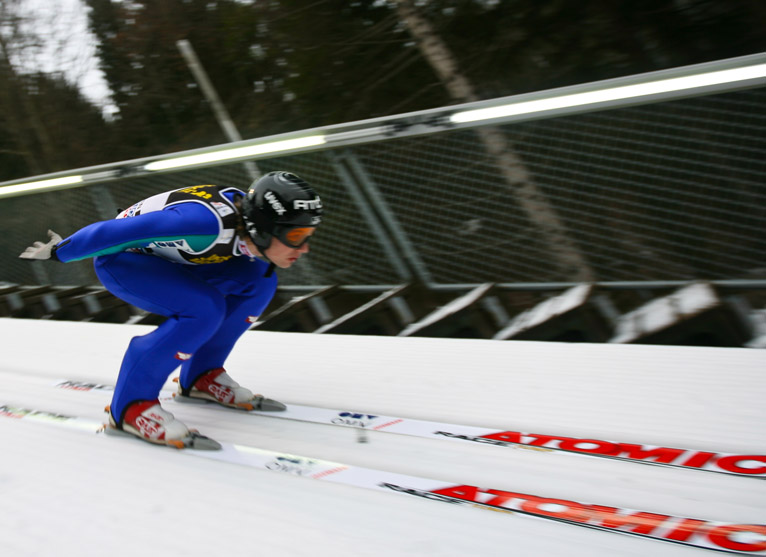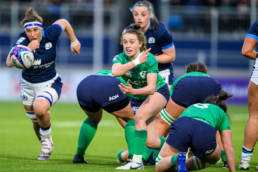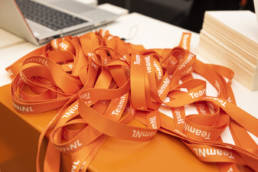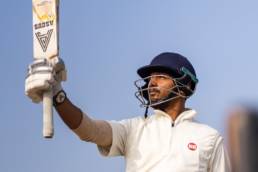Florian Schabereiter is a former ski jumper, National Assistant Coach of the Austrian Women’s National Ski Jumping Team 2013-2018 and National Assistant Coach of the Austrian Men’s National Ski Jumping Team 2018-2019. On junior level, he won two world championships. Only granted a short world cup career, Florian had to end his sporting career due to a disease at the young age of 21. Today, he works as an area manager for Hofer KG. In our TW1N Talk, he reflects upon his lessons learnt in his dual career, both from an athlete and a coach perspective.
TW1N: Florian, do you remember the beginning of your dual career story?
Florian Schabereiter: I do. However, this story does not start with “I always knew that it is important to think about the time after being an athlete”. In fact, it was completely different. As a talent, I attended the ski boarding school in Stams, Austria. I made this decision due to the reputation of the school. A lot of the world’s best ski jumpers were among its students. This is where I wanted to be and take my chance. Future? I had no idea what I might do one day after my sporting career would have ended. As a teenager, I think it is not natural to think about post-athletic life. There was only one focus: train, train, train, to become Olympic or world champion.
TW1N: Which role did education play back then for you?
Florian Schabereiter: Truth be told, school was always an annoying “must do” for me. I felt I was in school for training and getting better in my sport, not for studying. Consequently, I struggled with my marks. It was not easy to train hard every day, being hundreds of kilometres away from home, friends and family, with the additional pressure to pass school. I remember that I originally was convinced school would hinder my sporting career. Now, with years of distance, I can tell you that it is completely different.
TW1N: Let us try to get back to this point a bit later. But first, how did your athletic career develop further?
Florian Schabereiter: Not long after finishing school and being employed by the elite sport squad of the Austrian army, I became very sick. I was not able to train for a whole year. After that year, I decided to quit my sporting career. Honestly, I did not calculate with such a situation. From one moment to the other, my dream burst. This was one of the most difficult situations in my life. It was very hard to recognize that all you worked for in the past years was suddenly gone; the biggest thing in your life which you fully identify with. This sudden cut left me stunned.
TW1N: How did you cope with this situation?
Florian Schabereiter: It surely takes some time to realize what happens and to find oneself in a “new” life. What helped me a lot in this demanding process was the counselling service which is part of the Austrian dual career scheme. Together with a professional counsellor, I had a very intense phase of analyzing my experiences, identifying my skills and, essentially, getting behind my personality which I had further shaped in the time of high performance sport.
It was relieving to learn that I apparently had built a potent skill card, encompassing aspects such as resilience, self-management, capacity for team work or rhetoric competencies due to my public appearances. All these skills can be of great value for companies, organisations or federations. This new awareness was an emotional door opener to my ensuing studies (note: Florian holds a master’s degree in sport and movement science of the University of Graz, Austria) and subsequent post-athletic life in general.

“Athletes need to re-direct their thoughts”
TW1N: Earlier, you indicated that in contrast to your teenage beliefs, you no longer think that combining sport and studies is disadvantageous for an athletic career. Can you elaborate on this?
Florian Schabereiter: This would be an understatement. I do not only say a dual career is not disadvantageous, I am convinced it is highly beneficial for a sporting career. In retrospect, there is one thing catching my eye. I achieved my best athletic results when I was in situations of substantial double loads; a sport training load and a cognitive load respectively study load. Naturally, I asked myself how that could be the case. Today, I think I got some very logical answers.
First and foremost, my mind was given some “away-time” from sport during learning. As an athlete, you need to recover, to switch off. You cannot continuously be circling around the last or next jump. You need to temporarily free your brain from athletic thoughts. There is the well-known principle in sport science of the “optimum relation of workload and recovery” which refers to the required time of our body to recover after a certain workload. If you are not granting your body this time, you will get into the stage of overtraining resulting in a decreased performance curve. It is completely the same with our brain. How could it be different? Athletes need to actively re-direct their thoughts to get them off that topic which tends to monopolize their life.
TW1N: What do you mean by “actively re-directing thoughts”?
Florian Schabereiter: Even if you decide to do nothing and just relax, you will recognize that it is very difficult to switch off. It is much more effective to actively provide your brain with other “food”. As an athlete, your head mainly deals with processing athletic inputs such as movement patterns, tactics or, simply, ways to improve. My message is easy: Start systematically thinking about other things! Things that do not concern your life in such a brutally direct way as high performance sport. Studying is one perfect mean for this. You can do courses, go to university, or follow any other kind of adult education. In this way, you kill two, actually three, birds with one stone.
Studying helps you to regenerate. Studying will help your future vocational career. And, finally, studying will help you feel less pressured during your athletic activities as you are aware that there is “something else”; an alternative option independent of your sporting results. In my opinion, this last point is very often underestimated among athletes. Decreased perceived pressure will most likely lead to better performance. Moreover, having another impulse next to training and competition will probably let you enjoy your training more because of loving what you do and not because being forced to succeed.
TW1N: Is this the former athlete in you speaking, or do we hear the later coach as well?
Florian Schabereiter: You clearly hear both. My observations as a coach were very similar to my findings as an athlete. One of the things I monitored most was that those athletes focusing on sport-only sometimes got bogged down in their thoughts how to get better and better. Do not get me wrong, it is an essential part of high performance athletes to think about improvement, but this improvement cannot only be found in areas directly related to sport. Though, the dose rate of measures is decisive, like in every other aspect of life. Optimising your personal dose and balancing body and mind are key, even more so in disciplines which are strongly determined by mental performance, such as ski jumping.
TW1N: Is there any final advice you would like to share?
Florian Schabereiter: To every athlete; engaging yourself in other things will positively influence both your sporting career and future life. It is as simple as that. In addition, reaching out for professional support when it comes to planning your dual career pathway would be my additional tip. It helped me to get to know myself better and make choices.
TW1N: Thank you, Florian.
The TW1N Talk gives a voice to dual career. Athletes share their story. Practitioners provide insights into their work. Researchers introduce their studies. Projects present their results. Get in touch to become part of our mission to inspire the dual career movement in Europe and beyond.




